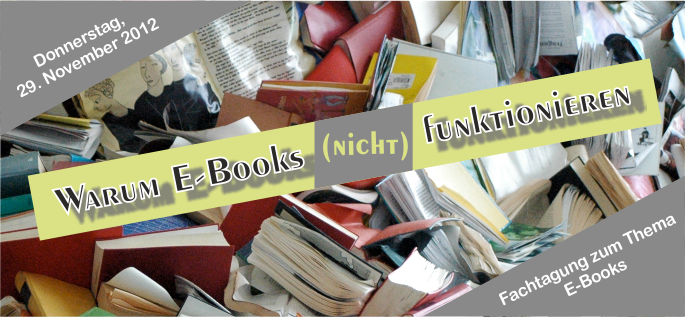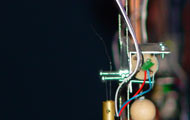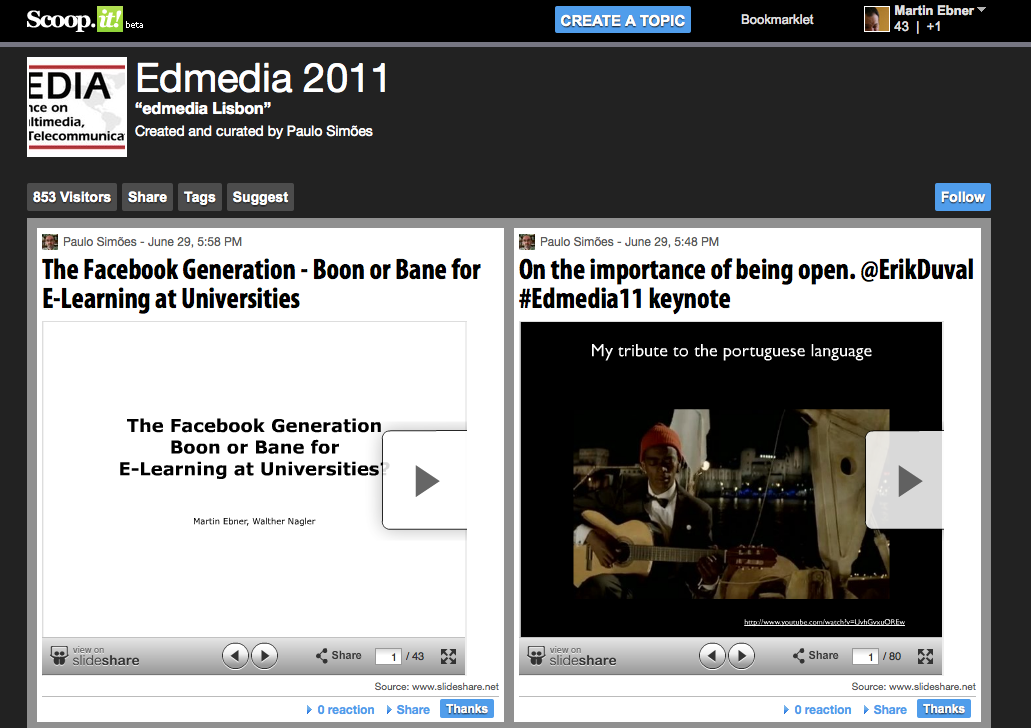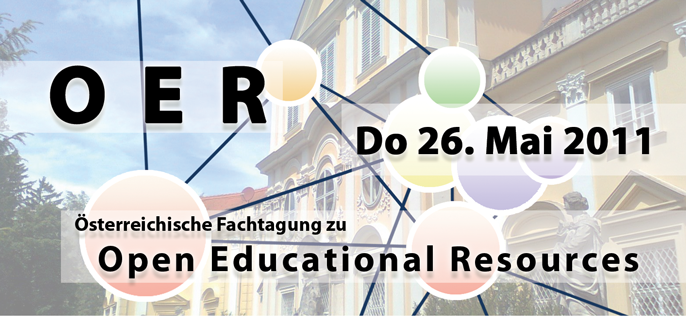This year ED-Media Conference 2012 in Denver is over and I had a great time, many scientific discussions. I did a short movie, about some highlights and impressions gathered during my stay. Enjoy it:
[L3T] L3T’s Work – Ein Film, ein Event und viele Fragen
In einem Monat wird L3T’s Work stattfinden und viele ExpertInnen aus dem deutschsprachigen Raum werden über die Zukunft von Lehrmaterialien nachdenken. Als Einstimmung gibt es einen kleinen Film – mehr auf der Webseite unter https://l3t.eu/zukunft
[conference] Erste aha-Konferenz
Im Rahmen der ersten aha-Konferenz in Wien zu „Lernen und Bildung für WegbereiterInnen einer neuen Lernkultur“ halten wir einen Workshop zum Thema „Einsatz von Learning Apps“ (Programm der Konferenz). Wir wollen hier die Arbeiten rund um app.tugraz.at aufzeigen und besonders auch den 1×1-Trainer vorstellen:
Der 1×1 Trainer wurde programmiert und das Erlernen des 1×1 gezielt zu unterstützen. Der entwickelte Algorithmus passt sich an die Leistungsfähigkeit des jeweiligen Kindes an. Damit ist möglich das Lernen sehr individuell zu gestalten und seitens der Lehrpersonen gezielt zu intervenieren. Hinter diesen Überlegungen steckt das Schlagwort Learning Analytics und im Workshop soll gezeigt werden, welches Potential hinter der Anhäufung und Auswertung vieler gewonnener Daten steckt. Gegenüberstellungen, Mängel und Stärken werden so schnell sichtbar und helfen der Lehrperson Unterricht gezielter und individueller zu gestalten. Mobile Learning hat Potentiale die es gilt zu nutzen und zu entdecken.
Die detaillierte Beschreibung des Workshops findet man hier. Wie immer freuen wir uns auf den Besuch, eine aktive Teilnahme und Rückmeldungen 🙂 .
[conference] Warum E-Books (nicht) funktionieren

Kurz vor der Osterpause, darf ich noch auf eine Fachtagung hinweisen, die die Grazer-E-Learning-Vereinigung iUNIg am 29.11.2012 veranstalten wird. Wie der Titel sagt, wird es rund um das Thema E-Books gehen:
Digitale Bücher, oft unter dem Schlagwort E-Book, dringen immer mehr in unseren Alltag ein. In der einfachsten Form öffnet man ein PDF auf dem eigenen Computer, als Fortgeschrittene/r lädt man sich beispielsweise mit dem Kindle ein Buch von Amazon auf sein Endgerät. Klar ist, dass uns Bücher heute in verschiedensten Formaten zur Verfügung stehen und eben nicht nur mehr als klassisches Printmedium. Besonders interessant erscheint dabei auch die Tatsache, dass in den USA bereits mehr E-Books als klassische Bücher verkauft werden.
Jetzt stellt sich die Frage, ob diese Bücher auch an den Hochschulen Einzug halten werden? Lesen die Studierenden von morgen überhaupt noch gedruckte Bücher? In welchen Formaten müssen digitale Bücher angeboten werden? Welche Geschäftsmodelle gibt es hier sowohl für AutorInnen als auch für LeserInnen? Was sind die nächsten technischen Entwicklungen? Je ausführlicher das Thema betrachtet wird, umso mehr Fragen tun sich auf, aber es zeigt sich auch, dass es sich hier nicht um einen kurzfristigen Hype handelt. Tatsächlich sind derzeit ganze Branchen im Umbruch: Verlage und Bibliotheken sind gleichermaßen wie Lehrende und Studierende davon betroffen.
Im Rahmen der Tagung werden wir den Bogen vom einfachen PDF bis hin zu multimedial angereicherten Leseunterlagen spannen und die damit verbundenen Vorteile und Herausforderungen mit ausgewählten ExpertInnen diskutieren. Alle die sich für E-Books interessieren sind herzlich eingeladen, sich aktiv an dieser Diskussion zu beteiligen.
Mehr Details, einen Call for Videos und die Anmeldung gibt es unter https://iunig.at.
[publication] E-Learning Model in Practice – Does it Work and Fit?
Our contribution to this year Global Time Conference about „E-Learning Model in Practice – Does it Work and Fit?“ is now online available as draft version.
Abstract:
This paper presents a general model of e-learning in higher education and compares four running e-learning courses for further education to each other. The courses are described and their account within the model is discussed. The main question in this context is to find out whether it is possible to make a generalization over all courses or not? In fact of all different impact factors, such as teaching strategies, scopes and results as well as their changes during the courses, it can be concluded that this e-learning model works in general for this kind of courses anyway.
Klicken Sie auf den unteren Button, um den Inhalt von www.scribd.com zu laden.
Reference: Ebner, M., Petrovic, M. (2012), E‐Learning Model in Practice – Does it Work and Fit?, Global Time Conference 2012, p. 1-7
[L3T] L3T’s Talk – Gespräch Nr. 3 mit Peter Baumgartner
 Peter Baumgarnter wird am Montag (13.2) um 18.00 Uhr unsere Online-Gesprächsreihe L3T’s Talk fortsetzen mit dem Thema „Persuasive Learning Design – Lerninhalte, die überzeugen„.
Peter Baumgarnter wird am Montag (13.2) um 18.00 Uhr unsere Online-Gesprächsreihe L3T’s Talk fortsetzen mit dem Thema „Persuasive Learning Design – Lerninhalte, die überzeugen„.
Elektronische Lernobjekte richten ihre didaktischen Möglichkeiten nicht immer ausreichend an den individuellen Bedürfnissen, Interessen und Lernmotiven der Lernenden aus. Persuasive (überzeugende) Lerninhalte erfordern ein Learning Design, das aufgrund seiner didaktischen und technischen Vielfalt Einfluss auf das individuelle Interaktions- und Lernverhalten der Lernenden nimmt. Einige grundlegende Designprinzipien persuasiver Systeme hat J.B. Fogg ausgearbeitet ( https://www.bjfogg.com/).
Im Projekt EuroPLOT arbeiten wir daran, diese Prinzipien auf die Didaktik zu übertragen.
Die Teilnahme ist frei und hier gibt es eine detaillierte Beschreibung zur Installation der Software, sowie eine Kurzanleitung.
Es ist zu beachten, dass derzeit nur ein Windows-Client existiert – für alle anderen Endgeräte (MacOS), Tablets (iPad, …) oder Smartphones gibt es einen Webstream.
[presentation] Open Educational Resources are different
Our talk on „Open Educational Resources are different“ at this year MWB 2011 conference in Innsbruck is now online available. Main we are talking about our textbook-project L3T and the relationship to Open Educational Resources:
Klicken Sie auf den unteren Button, um den Inhalt von www.slideshare.net zu laden.
[podcast] Digitales Leben: Wissen für alle – Open Educational Resources
 Im Rahmen der Serie Digitales Leben vom Radiosender Ö1 ist ein Beitrag zu Open Educational Resources entstanden. Die Interviews sind im Rahmen unserer iUNIg-Tagung im Mai geführt worden und zeigen wie wichtig es ist an Projekten wie L3T festzuhalten.
Im Rahmen der Serie Digitales Leben vom Radiosender Ö1 ist ein Beitrag zu Open Educational Resources entstanden. Die Interviews sind im Rahmen unserer iUNIg-Tagung im Mai geführt worden und zeigen wie wichtig es ist an Projekten wie L3T festzuhalten.
Social Media Stream at ED-Media Conference
Last week this year ED-Media Conference took place in Lisbon, Portugal. I as member of the Steering Committee was elected beforehand to coordinate the Social Media Team. Our task was to handle the Twitter stream (#edmedia11) as well as engage people to interact online.
The result is quite amazing – 4 days of Twitter use leads to more than 3700 tweets (see here a statistic) and a lot of further online material.
Paulo colleted also all URLs of the stream in our own ED-Media Scoop.it Page – take a look on this, I think we did a good work.
Finally thanks a lot to my team for working with you for just 4 days (and it’s worth to follow them on Twitter): @pgsimoes, @_joanasilva_, @etutoria, @AMargaridaMaia, @GCruzMatos, @jjmpleal
[conference] Facebook-Gewinnspiel
Ich möchte an dieser Stelle, einerseits nochmals auf die iUNIg-Tagung am 26.5.2011 hinweisen und andererseits auch auf das Facebook-Gewinnspiel, mit der man eine Eintrittskarte gewinnen kann. Also wir sind gespannt auf die Pinnwandeinträge und freuen uns euch in Graz begrüßen zu können.


